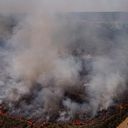Amazon rainforest nears tipping points, but it's not too late: study finds

As much as half of the Amazon rainforest may cross tipping points as soon as 2050, beyond which those areas would no longer support such an abundance of life and buffer Earth from climate change, a new study shows.
Why it matters: The Amazon is home to more than 10% of Earth's biodiversity and holds up to 20 years' worth of global carbon dioxide emissions.
Threat level: It is also extremely fragile in the face of climate change, which along with deforestation has largely driven its decline.
- If large parts of the rainforest were to deteriorate and abruptly transition into a different type of ecosystem, it would affect the entire planet's carbon balance sheet.
Yes, but: A catastrophic collapse of the entire forest is unlikely during this century, the study published Wednesday in the journal Nature says.
- Though the study says it's plausible that half of the Amazon forest will cross tipping points by 2050, it says that it's not inevitable.
- Greenhouse gas emissions cuts and curbs in deforestation, among other measures, would reduce the likelihood and severity of large-scale shifts, the study finds.
- For now, though, the trend lines are clearly pointing toward an overall deterioration of the forest.
Zoom in: In the study, an international team of scientists examined possible points at which portions of the Amazon would transition permanently into a totally different type of ecosystem.
- The researchers find that by 2050, between 10% and 47% of Amazonian forests may undergo sudden ecosystem transitions that could worsen regional climate change, with global consequences.
What they did: The study combines multiple lines of evidence from prior research. It looks at five major drivers of water stress on the forests, and the critical thresholds of these drivers that could trigger tipping points.
- A major goal has been to determine both land use and climate-related boundaries that would provide a safe space for the existing rainforest habitat to continue to thrive.
Of note: "The consequences of losing the Amazon forest, or even parts of it, imply that we must follow a precautionary approach — that is, we must take actions that contribute to maintain the Amazon forest within safe boundaries," the study states.
What they're saying: In the southern Amazon, the dry season has grown 4 to 5 weeks longer since 1979, study coauthor Carlos Nobre told Axios via email.
- "If the dry season continues to increase its length, when it reaches six months, it is highly likely that it would turn into the degraded, open-canopy ecosystem" which would store far less carbon, he said.
- He pointed to a combination of global warming-related droughts, such as the one this year, and deforestation for lengthening the dry season.
- "We need urgently nature-based solutions. Zero deforestation, degradation and fires," he said.
- "All of that can help avoid the tipping point, but only if we globally succeed in not letting the global warming exceed 1.5 C."
The big picture: The Amazon forest has seen temperatures increase considerably during recent decades, with dry season mean temperatures increasing by more than 2°C (3.6°F) in the central and southeastern Amazon.
- Hotter temperatures can reduce forest productivity and trees' ability to store carbon.
- In the southeastern portion of the forest, trees are now emitting more CO2 than they absorb, tied to deforestation and fire, the study found.
Between the lines: Human-caused climate change is causing the Amazon to be less resistant to dramatic shifts, in contrast to past episodes in which the forest withstood natural episodes of climate change.
- The study recommends setting a "safe boundary" for the Amazon at a global warming severity of just 1.5°C above preindustrial levels, as contained in the Paris Climate Agreement.
- However, the world is currently on course to sail past that goal, on the way to more than 2°C of warming during this century.
- The researchers from four continents also outlined safe boundaries for dry season length and annual rainfall, among other climate characteristics.
The intrigue: There will be an increasingly bright spotlight put on Amazonian conditions given Brazil's chairmanship of the G20 this year, and the country's hosting of the COP30 climate summit in the Amazon-adjacent city of Belém.